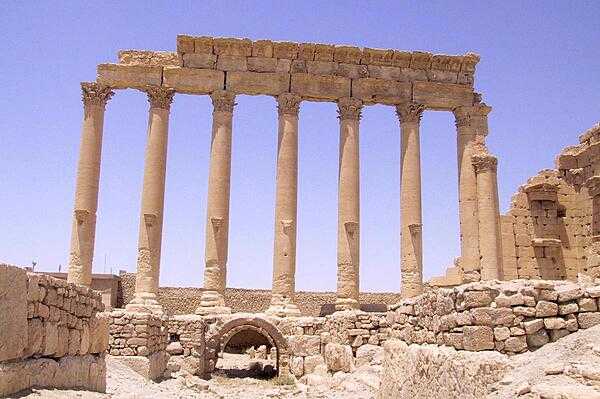Syria - SY - SYR - SYR - Middle East

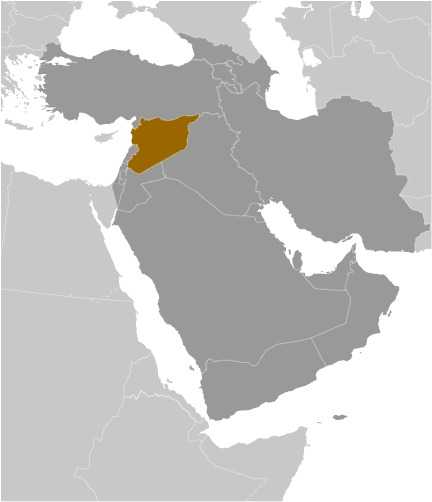
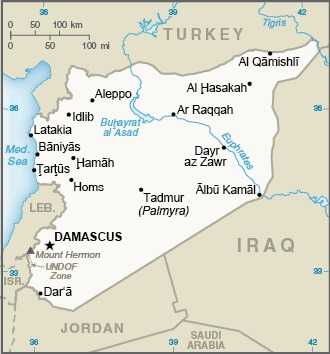
Syria Images
Syria Factbook Data
Diplomatic representation from the US
mailing address: 6110 Damascus Place, Washington DC 20521-6110
email address and website:
USIS_damascus@embassy.mzv.cz
https://sy.usembassy.gov/
Age structure
15-64 years: 62.8% (male 7,475,355/female 7,522,797)
65 years and over: 4.2% (2024 est.) (male 468,730/female 532,271)
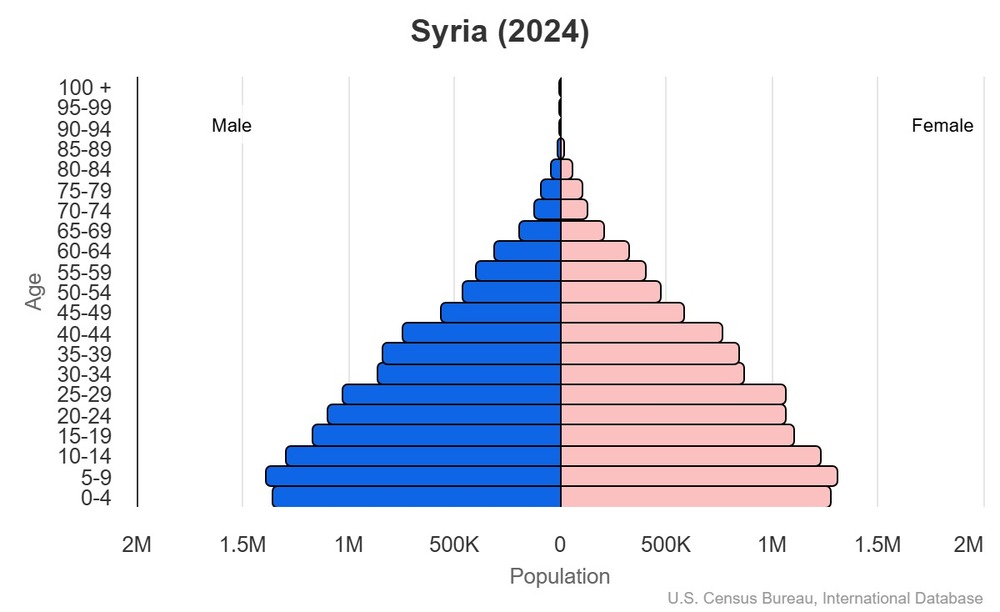
For additional information, please see the entry for Population pyramid on the Definitions and Notes page.
Geographic coordinates
Sex ratio
0-14 years: 1.05 male(s)/female
15-64 years: 0.99 male(s)/female
65 years and over: 0.88 male(s)/female
total population: 1.01 male(s)/female (2024 est.)
Natural hazards
volcanism: Syria's two historically active volcanoes, Es Safa and an unnamed volcano near the Turkish border, have not erupted in centuries
Area - comparative
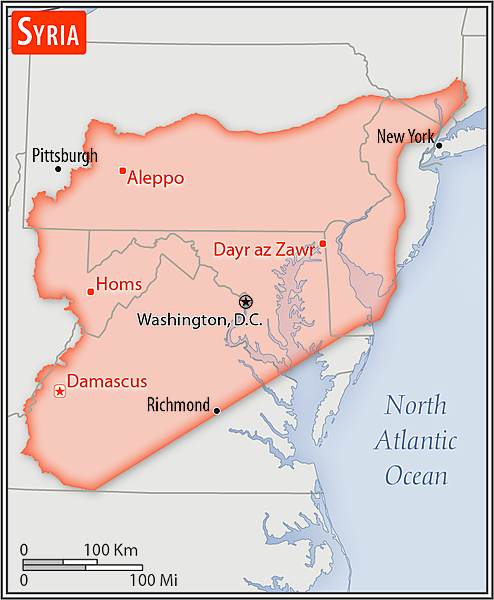
Military service age and obligation
Background
After World War I, France acquired a mandate over the northern portion of the former Ottoman Empire province of Syria. The French administered the area until granting it independence in 1946. The new country lacked political stability and experienced a series of military coups. Syria united with Egypt in 1958 to form the United Arab Republic. In 1961, the two entities separated, and the Syrian Arab Republic was reestablished. In the 1967 Arab-Israeli War, Syria lost control of the Golan Heights region to Israel. During the 1990s, Syria and Israel held occasional, albeit unsuccessful, peace talks over its return. In 1970, Hafiz al-ASAD, a member of the socialist Ba'ath Party and the minority Alawi sect, seized power in a bloodless coup and brought political stability to the country. Following the death of al-ASAD, his son, Bashar al-ASAD, was approved as president by popular referendum in 2000. Syrian troops that were stationed in Lebanon since 1976 in an ostensible peacekeeping role were withdrawn in 2005. During the 2006 conflict between Israel and Hizballah, Syria placed its military forces on alert but did not intervene directly on behalf of its ally Hizballah. In 2007, Bashar al-ASAD's second term as president was again approved in a referendum.
In the wake of major uprisings elsewhere in the region, antigovernment protests broke out in the southern province of Dar'a in 2011. Protesters called for the legalization of political parties, the removal of corrupt local officials, and the repeal of the restrictive Emergency Law allowing arrests without charge. Demonstrations and violent unrest spread across Syria, and the government responded with concessions, but also with military force and detentions that led to extended clashes and eventually civil war. International pressure on the Syrian Government intensified after 2011, as the Arab League, the EU, Turkey, and the US expanded economic sanctions against the ASAD regime and those entities that supported it. In 2012, more than 130 countries recognized the Syrian National Coalition as the sole legitimate representative of the Syrian people. In 2015, Russia launched a military intervention on behalf of the ASAD regime, and domestic and foreign-government-aligned forces recaptured swaths of territory from opposition forces. With foreign support, the regime continued to periodically regain opposition-held territory until 2020, when Turkish firepower halted a regime advance and forced a stalemate between regime and opposition forces. The government lacks territorial control over much of the northeastern part of the country, which the predominantly Kurdish Syrian Democratic Forces (SDF) hold, and a smaller area dominated by Turkey.
Since 2016, Turkey has conducted three large-scale military operations to capture territory along Syria's northern border. Some opposition forces organized under the Turkish-backed Syrian National Army and Turkish forces have maintained control of northwestern Syria along the Turkish border with the Afrin area of Aleppo Province since 2018. The violent extremist organization Hay’at Tahrir al-Sham (formerly the Nusrah Front) emerged in 2017 as the predominant opposition force in Idlib Province, and still dominates an area also hosting Turkish forces. Negotiations have failed to produce a resolution to the conflict, and the UN estimated in 2022 that at least 306,000 people have died during the civil war. Approximately 6.7 million Syrians were internally displaced as of 2022, and 14.6 million people were in need of humanitarian assistance across the country. An additional 5.6 million Syrians were registered refugees in Turkey, Jordan, Iraq, Egypt, and North Africa. The conflict in Syria remains one of the two largest displacement crises worldwide (the other is the full-scale invasion of Ukraine).
On 8 December 2024, Syrian Islamist rebels captured the capital city of Damascus and overthrew President Bashar al-ASAD. The former president and his family fled to Moscow, where they were granted political asylum. The al-ASAD regime had ruled Syria for over 50 years.
Environmental issues
International environmental agreements
signed, but not ratified: Environmental Modification
Household income or consumption by percentage share
highest 10%: 21.1% (2022 est.)
note: % share of income accruing to lowest and highest 10% of population
Exports - commodities
note: top five export commodities based on value in dollars
Exports - partners
note: top five export partners based on percentage share of exports
Administrative divisions
Agricultural products
note: top ten agricultural products based on tonnage
Military and security forces
Budget
expenditures: $3.211 billion (2017 est.)
note: government projections for FY2016
Capital
geographic coordinates: 33 30 N, 36 18 E
time difference: UTC+3 (8 hours ahead of Washington, DC, during Standard Time)
etymology: the city has an ancient, pre-Semitic name of unknown origin
Imports - commodities
note: top five import commodities based on value in dollars
Climate
Coastline
Constitution
Exchange rates
Exchange rates:
2,505.747 (2022 est.)
1,256 (2021 est.)
877.945 (2020 est.)
436.5 (2019 est.)
436.5 (2018 est.)
Executive branch
head of government: Prime Minister Muhammad al-BASHIR (since 8 December 2024)
cabinet: Council of Ministers appointed by the president
election/appointment process: president directly elected by simple-majority popular vote for a 7-year term (eligible for a second term); the president appoints the vice president and prime minister
most recent election date: 26 May 2021
election results:
2021: Bashar al-ASAD elected president; percent of vote - Bashar al-ASAD (Ba'th Party) 95.2%, Mahmoud Ahmad MAREI (Democratic Arab Socialist Union) 3.3%, other 1.5%
2014: Bashar al-ASAD elected president; percent of vote - Bashar al-ASAD (Ba'th Party) 88.7%, Hassan al-NOURI (independent) 4.3%, Maher HAJJER (independent) 3.2%, other/invalid 3.8%
expected date of next election: 2028
Flag
meaning: the design is the same as a previous Syrian national flag (in use 1932-58 and 1961-63), but it is still unclear if the elements will retain the same meanings; the bands formerly represented Syria’s past rulers: white (Umayyad Caliphate), black (Abbasid Caliphate), and green (Rashidun Caliphate); the first star represented Damascus, Aleppo, and Deir ez-Zor, the three administrative subdivisions in Syria in the 1930s; the second star stood for Jabal Druze (the Mountain of the Druze), and the third star for the Alawite Mountains
history: in 2011, opponents to the Asad regime adopted the flag; in 2025, it became the new national flag, replacing the two-star design
Independence
Industries
Judicial branch
judge selection and term of office: Court of Cassation judges appointed by the Supreme Judicial Council (SJC), a judicial management body headed by the minister of justice with 7 members, including the national president; judge tenure NA; Supreme Constitutional Court judges nominated by the president and appointed by the SJC; judges serve 4-year renewable terms
subordinate courts: courts of first instance; magistrates' courts; religious and military courts; Economic Security Court; Counterterrorism Court
Land boundaries
border countries (5): Iraq 599 km; Israel 83 km; Jordan 379 km; Lebanon 403 km; Turkey 899 km
Land use
arable land: 24% (2023 est.)
permanent crops: 5.7% (2023 est.)
permanent pasture: 44.5% (2023 est.)
forest: 2.9% (2023 est.)
other: 23% (2023 est.)
Legal system
Legislative branch
legislative structure: unicameral
number of seats: 210 (140 indirectly elected; 70 appointed)
electoral system: plurality/majority
scope of elections: full renewal
term in office: 4 years
most recent election date: 10/5/2025
percentage of women in chamber: 9.6%
expected date of next election: March 2030
Literacy
male: 97.2% (2021 est.)
female: 91.8% (2021 est.)
Maritime claims
contiguous zone: 24 nm
International organization participation
National holiday
note: celebrates the last French troops departing and the proclamation of full independence
Nationality
adjective: Syrian
Natural resources
Geography - note
Economic overview
Political parties
Arab Socialist Ba'ath Party
Arab Socialist (Ba'ath) Party – Syrian Regional
Arab Socialist Ba'ath Party – Syrian Regional Branch, Socialist Unionist Democratic Party
Arab Socialist Union of Syria or ASU
Democratic Arab Socialist Union
National Progressive Front or NPF
Socialist Unionist Democratic Party
Socialist Unionist Party
Syrian Communist Party (two branches)
Syrian Social Nationalist Party or SSNP
Unionist Socialist Party
major political organizations:
Kurdish Democratic Union Party or PYD
Kurdish National Council or KNC
Syriac Union Party
Syrian Democratic Council or SDC
Syrian Democratic Party
Syrian Opposition Coalition
de facto governance entities:
Democratic Autonomous Administration of Northeast Syria or DAANES
Syrian Interim Government or SIG
Syrian Salvation Government or SSG
Railways
standard gauge: 1,801 km (2014) 1.435-m gauge
narrow gauge: 251 km (2014) 1.050-m gauge
Suffrage
Terrain
Government type
Country name
conventional short form: Syria
local long form: Al Jumhuriyah al Arabiyah as Suriyah
local short form: Suriyah
former: United Arab Republic (with Egypt)
etymology: the source of the name is uncertain; the name appears as "Suri" in Babylonian cuneiform writings dating from about 4000 B.C.
Location
Map references
Irrigated land
Diplomatic representation in the US
note: operations at the embassy were suspended on 18 March 2014
Internet users
Internet country code
Refugees and internally displaced persons
IDPs: 7,408,809 (2024 est.)
stateless persons: 160,000 (2024 est.)
GDP (official exchange rate)
note: data in current dollars at official exchange rate
Trafficking in persons
Total renewable water resources
Urbanization
rate of urbanization: 5.38% annual rate of change (2020-25 est.)
Broadcast media
Drinking water source
urban: 95.6% of population (2022 est.)
rural: 92.1% of population (2022 est.)
total: 94.1% of population (2022 est.)
unimproved:
urban: 4.4% of population (2022 est.)
rural: 7.9% of population (2022 est.)
total: 5.9% of population (2022 est.)
National anthem(s)
lyrics/music: Khalil Mardam BEY/Mohammad Salim FLAYFEL and Ahmad Salim FLAYFEL
history: adopted 1936, restored 1961; the country had a different anthem between 1958 and 1961, when Syria was part of the United Arab Republic
Major urban areas - population
International law organization participation
Physician density
Hospital bed density
National symbol(s)
GDP - composition, by end use
government consumption: 2.7% (2022 est.)
investment in fixed capital: 4.5% (2022 est.)
exports of goods and services: 6.8% (2022 est.)
imports of goods and services: -28.8% (2022 est.)
note: figures may not total 100% due to rounding or gaps in data collection
Dependency ratios
youth dependency ratio: 52.4 (2024 est.)
elderly dependency ratio: 6.7 (2024 est.)
potential support ratio: 15 (2024 est.)
Citizenship
citizenship by descent only: the father must be a citizen of Syria; if the father is unknown or stateless, the mother must be a citizen of Syria
dual citizenship recognized: yes
residency requirement for naturalization: 10 years
Population distribution
note: the recent civil war has altered the population distribution
Electricity access
electrification - urban areas: 100%
electrification - rural areas: 75%
Civil aircraft registration country code prefix
Sanitation facility access
urban: 99.8% of population (2022 est.)
rural: 99.3% of population (2022 est.)
total: 99.6% of population (2022 est.)
unimproved:
urban: 0.2% of population (2022 est.)
rural: 0.7% of population (2022 est.)
total: 0.4% of population (2022 est.)
Ethnic groups
Religions
note: the Christian population may be considerably smaller as a result of Christians fleeing the country during the ongoing civil war
Languages
major-language sample(s):
كتاب حقائق العالم، المصدر الذي لا يمكن الاستغناء عنه للمعلومات الأساسية (Arabic)
ڕاستییەکانی جیهان، باشترین سەرچاوەیە بۆ زانیارییە بنەڕەتییەکان (Kurdish)
The World Factbook, the indispensable source for basic information.
Imports - partners
note: top five import partners based on percentage share of imports
Military expenditures
6.7% of GDP (2018 est.)
6.8% of GDP (2017 est.)
6.9% of GDP (2016 est.)
7.2% of GDP (2015 est.)
Elevation
lowest point: Yarmuk River -66 m
mean elevation: 514 m
Health expenditure
Military - note
the UN Disengagement Observer Force (UNDOF) has operated in the Golan between Israel and Syria since 1974 to monitor the ceasefire following the 1973 Arab-Israeli War and supervise the areas of separation between the two countries; UNDOF has about 1,300 personnel (2025)
Military and security service personnel strengths
Terrorist group(s)
note: details about the history, aims, leadership, organization, areas of operation, tactics, targets, weapons, size, and sources of support of the group(s) appear(s) in the Terrorism reference guide
Total water withdrawal
industrial: 615.4 million cubic meters (2022 est.)
agricultural: 14.67 billion cubic meters (2022 est.)
Waste and recycling
percent of municipal solid waste recycled: 2.5% (2010 est.)
Major watersheds (area sq km)
Major rivers (by length in km)
note: [s] after country name indicates river source; [m] after country name indicates river mouth
National heritage
selected World Heritage Site locales: Ancient City of Damascus; Ancient City of Bosra; Site of Palmyra; Ancient City of Aleppo; Crac des Chevaliers and Qal’at Salah El-Din; Ancient Villages of Northern Syria
Coal
imports: 15,000 metric tons (2023 est.)
Electricity generation sources
solar: 0.5% of total installed capacity (2023 est.)
hydroelectricity: 3.8% of total installed capacity (2023 est.)
biomass and waste: 0.2% of total installed capacity (2023 est.)
Natural gas
consumption: 2.763 billion cubic meters (2023 est.)
proven reserves: 240.693 billion cubic meters (2021 est.)
Petroleum
refined petroleum consumption: 102,000 bbl/day (2023 est.)
crude oil estimated reserves: 2.5 billion barrels (2021 est.)
Space program overview
Space agency/agencies
Remittances
0% of GDP (2022 est.)
0% of GDP (2021 est.)
note: personal transfers and compensation between resident and non-resident individuals/households/entities
Ports
large: 1
medium: 1
small: 1
very small: 0
ports with oil terminals: 3
key ports: Al Ladhiqiyah, Baniyas, Tartus
National color(s)
Particulate matter emissions
Methane emissions
agriculture: 144.7 kt (2019-2021 est.)
waste: 138 kt (2019-2021 est.)
other: 1.3 kt (2019-2021 est.)
Key space-program milestones
2016 - signed a scientific cooperation agreement in the field of space technology and remote sensing with Russia
2018 - announced that developing a satellite would be a primary goal of the space program
Labor force
note: number of people ages 15 or older who are employed or seeking work
Youth unemployment rate (ages 15-24)
male: 27.8% (2024 est.)
female: 47.9% (2024 est.)
note: % of labor force ages 15-24 seeking employment
Debt - external
note: present value of external debt in current US dollars
Maternal mortality ratio
Unemployment rate
13.2% (2023 est.)
13.3% (2022 est.)
note: % of labor force seeking employment
Population
male: 11,981,578
female: 11,883,845
Carbon dioxide emissions
from coal and metallurgical coke: 33,000 metric tonnes of CO2 (2023 est.)
from petroleum and other liquids: 14.79 million metric tonnes of CO2 (2023 est.)
from consumed natural gas: 5.42 million metric tonnes of CO2 (2023 est.)
Area
land: 185,887 sq km
water: 1,550 sq km
note: includes 1,295 sq km of Israeli-occupied territory
Real GDP (purchasing power parity)
$100.066 billion (2022 est.)
$99.338 billion (2021 est.)
note: data in 2021 dollars
Airports
Gini Index coefficient - distribution of family income
note: index (0-100) of income distribution; higher values represent greater inequality
Inflation rate (consumer prices)
98.3% (2021 est.)
114.2% (2020 est.)
note: annual % change based on consumer prices
Real GDP per capita
$4,500 (2022 est.)
$4,600 (2021 est.)
note: data in 2021 dollars
Broadband - fixed subscriptions
subscriptions per 100 inhabitants: 7 (2023 est.)
Obesity - adult prevalence rate
Energy consumption per capita
Electricity
consumption: 15.522 billion kWh (2023 est.)
exports: 358.723 million kWh (2023 est.)
transmission/distribution losses: 4.214 billion kWh (2023 est.)
Merchant marine
by type: bulk carrier 1, container ship 1, general cargo 8, oil tanker 1, other 13
Imports
$6.56 billion (2021 est.)
$3.751 billion (2020 est.)
note: GDP expenditure basis - imports of goods and services in current dollars
Exports
$2.227 billion (2021 est.)
$1.649 billion (2020 est.)
note: GDP expenditure basis - exports of goods and services in current dollars
Heliports
Telephones - fixed lines
subscriptions per 100 inhabitants: 12 (2023 est.)
Alcohol consumption per capita
beer: 0.02 liters of pure alcohol (2019 est.)
wine: 0 liters of pure alcohol (2019 est.)
spirits: 0.11 liters of pure alcohol (2019 est.)
other alcohols: 0 liters of pure alcohol (2019 est.)
Life expectancy at birth
male: 73.4 years
female: 76.4 years
Real GDP growth rate
0.7% (2022 est.)
1.9% (2021 est.)
note: annual GDP % growth based on constant local currency
Industrial production growth rate
note: annual % change in industrial value added based on constant local currency
GDP - composition, by sector of origin
industry: 12% (2022 est.)
services: 44.9% (2022 est.)
note: figures may not total 100% due to non-allocated consumption not captured in sector-reported data
Military equipment inventories and acquisitions
Gross reproduction rate
Net migration rate
Median age
male: 23.6 years
female: 24.7 years
Total fertility rate
Infant mortality rate
male: 16.6 deaths/1,000 live births
female: 13.5 deaths/1,000 live births
Telephones - mobile cellular
subscriptions per 100 inhabitants: 80 (2021 est.)
